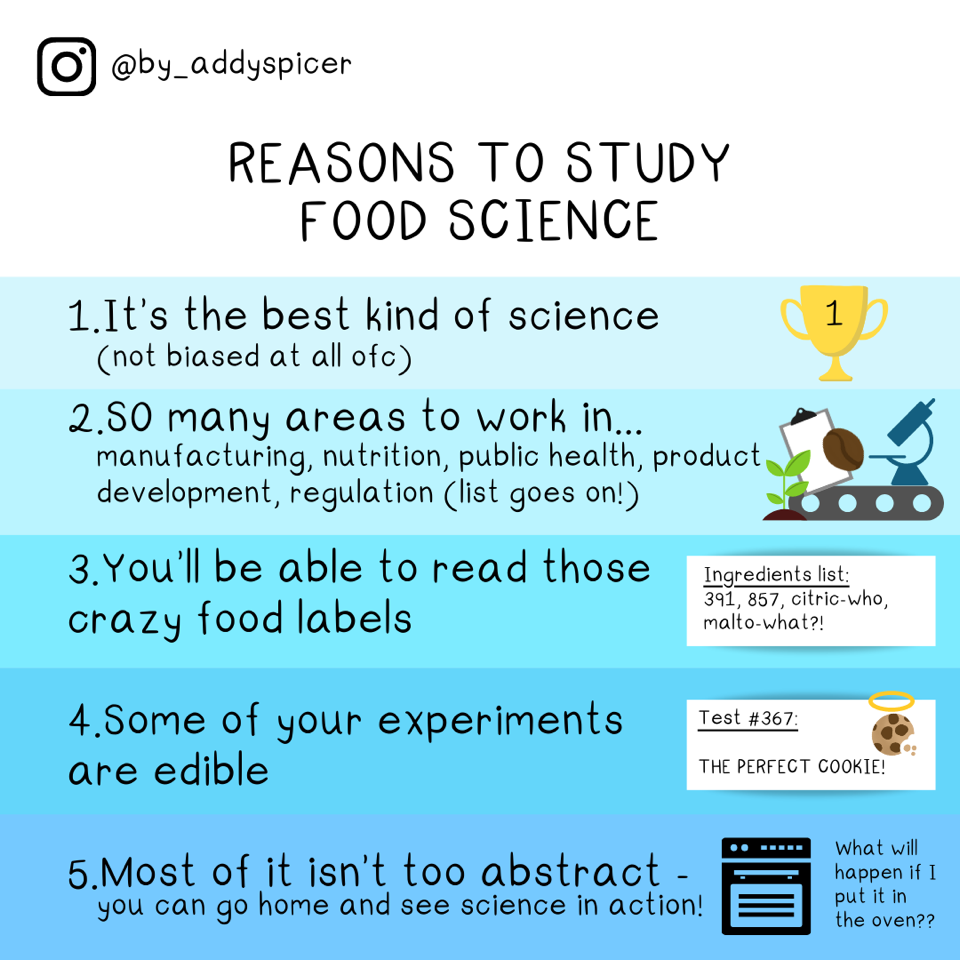What is food science and food technology?
As defined by the Institute of Food Technologists (IFT), food science and technology is:
"...the discipline in which the engineering, biological, and physical sciences are used to study the nature of foods, the causes of deterioration, the principles underlying food processing, and the improvement of foods for the consuming public.”
The major areas within the food science and technology fields include food chemistry, food microbiology, sensory and consumer sciences, food engineering, quality assurance, innovation, nutrition and regulation.
What would a world without food science look like?
What would a world without packaging look like? 
Food scientists and food technologists are those who study, research, innovate and improve food products and processes to ensure safety, quality and nutritional adequacy are maintained in food products for a vast range of consumer needs.
Food Technologists are responsible for the safety and quality of products that thousands of people could eat every day. This is a big responsibility, especially with the increasing prevalence of specific dietary requirements. Food Technologists also source ingredients for products, as well as finding the best way to combine, process, store and preserve food in order to maintain taste and nutritional value.
| | |
For further information on careers in food science visit our dedicated webpage HERE 
| |
Where to study food science and technology?
Food science can be studied at a variety of different institutions around Australia. For a complete list of institutes and courses, see our Universities and Courses page.
|
 From Farm to Plate From Farm to PlateFood scientists and technologists have input all the way through the value chain – from farm to plate
1. Farm Inputs
- Before producing crops/livestock, rigorous research and development need to be undertaken to determine what fertilisers, pesticides and production techniques will best suit the crop or livestock to ensure quality and to produce sufficient yield. Research of regulations and standards needs to be undertaken to ensure the crop or livestock is also safe for consumption
- Jobs within this area: Crop Scientist, Geneticist, Agronomist, Quality Assurance.
2. Production/Processing
- Food technologists, food microbiologists, food product developers and food engineers may all be required at this stage to produce an innovative or improved product that will be of high quality and safe to consume. Quality assurance is also essential to ensure that all products are fit for consumption.
- Packaging technologists are needed at this point to create packaging that is inert and protects the product.
- Marketers are required to create packaging that promotes the product sufficiently.
- Jobs within this area: Food Scientist, Food Technologist, Food Microbiologist, Food Product Developer, Food Engineer, Regulatory Compliance Officer, Quality Assurance Officer, Packaging Technologist, Sensory Scientist, Nutritionist, Marketer, Supply Chain Manager.
3. Transportation/Logistics
- R&D is required to determine what kind of storage the product needs to withstand transportation periods.
- Packaging technologists need to consider the damage that may occur from transportation and optimal methods of transportation to decrease costs. Special consideration needs to be made for transporting hot and cold food products and maintaining safe levels to cook/chill guidelines.
- Jobs within this area: Logistics Manager.
4. Marketing & Sales
- Marketing is important to ensure that the product is promoted to a sufficient degree at retail level. Market research is also crucial at this step to analyse the food industry and determine where consumer demand lies. By researching the market and obtaining consumer feedback, companies can make informed decisions on where they would like to sell their product to ensure that it is received by their target market.
- Jobs within this area: Marketer, Market Researcher, Market Analyst.
5. Consumer
- Consumers drive demand; thus it is imperative for market researchers to analyse trends and forecast potential trends to ensure product relevance in the market.
- Jobs within this area: Market Researcher, Market Analysis
| |
Mentorships, webinars, complimentary journal & newsletter, site tours, portal access & more!
|
 From Farm to Plate
From Farm to Plate



